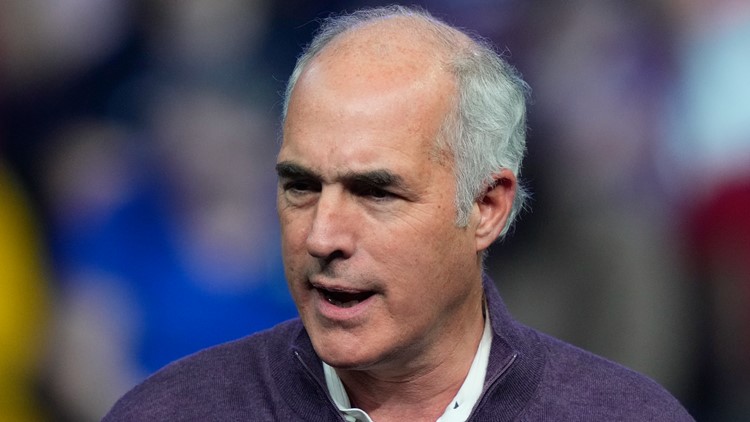HARRISBURG, Pa. — Democratic Sen. Bob Casey will seek a fourth term in office, bringing the power of incumbency and unmatched name recognition in Pennsylvania politics to his party’s defense of a seat in a critical presidential battleground state.
The announcement by Casey, the longest-serving Democratic U.S. senator in Pennsylvania history, gives Democrats a boost ahead of a difficult 2024 Senate map. They must defend incumbents not only in red states — Montana, Ohio and West Virginia — but also in multiple swing states.
Casey, who will turn 63 in a few days, is a key ally of labor unions and President Joe Biden. In Congress, Casey, a moderate Democrat, has backed all of Biden’s top priorities and forged a close relationship with the president, at least in part because the men also have a bond that goes beyond politics: They hail from the same hometown of Scranton.
In running for reelection, Casey’s message sounds similar to how Biden’s campaign for a second term may sound. Casey points to landmark bills produced by a Democratic-controlled Congress that would expand spending on infrastructure such as airports and broadband internet, to reinvigorate a domestic semiconductor industry, to subsidize hydrogen fuel plants and to lower drug costs for Medicare recipients.
Casey has cast himself as standing up to what he calls “corporate special interests,” and said there is more to do to lower the cost of living for working families, such as child care or prescription drugs.
“That means being willing to fight and not back down from any fight for those communities and those families,” Casey said in an interview last week.
The Senate Republicans’ campaign arm, the National Republican Senatorial Committee, is already attacking Casey for voting for laws under Biden that they say have worsened inflation, and threatened Social Security and Medicare – two programs that Casey has long championed.
Casey said Republicans “dreamed that up” and countered that the GOP has long been hostile to Medicaid, Medicare and Social Security by proposing budgets and policy ideas that would “devastate” the programs.
Republicans do not have a deep bench to challenge Casey, but they do have one potential top-tier candidate: former hedge fund CEO David McCormick, who narrowly lost the GOP nomination for Senate in 2022 to Dr. Mehmet Oz.
McCormick, who has strong support from party brass, has a solid-gold resume as a decorated Gulf War veteran who graduated from West Point, got a doctoral degree from Princeton, served in the highest levels of then-President George W. Bush’s administration and ran one of the world’s largest hedge funds.
He also has deep pockets and connections across spheres of politics, business and government from which to draw endorsements and campaign contributions — none of which was enough to prevail against Oz, the Donald Trump-backed candidate who went on to lose the general election to Democrat John Fetterman.
If he runs, McCormick may have a contested primary: State Sen. Doug Mastriano has said he may run and suggested that he would win a primary “hands down.” That is prompting handwringing from party leaders after Mastriano, endorsed by Trump, ran a hard-right campaign in the governor’s race last year and was beaten soundly.
Many Republicans acknowledge that it will be difficult to beat Casey. Some privately say he can’t be beaten.
Casey is perhaps Pennsylvania’s best-known politician, even if he has a relatively low profile in Washington without a prime committee chairmanship in his portfolio. In Pennsylvania, he has run statewide seven times already — winning six of those races — and is the son of the state’s former two-term governor.
He has never ran a close race for Senate — he won his 2018 race by 13 percentage points — and kept an active schedule on the campaign trail last year by helping Fetterman.
Still, Casey said he always expects a tough race, given Pennsylvania’s status as a battleground state.
“I’ve been spending years on the road and going to all of our 67 counties and delivering for the people of our state and communities in our state,” Casey said. “And that’s the kind of approach I’ll take to the campaign: We’re going to go everywhere and try to earn every vote.”
The one-time “pro-life Democrat” backed a bill last year to write abortion rights into federal law when it became apparent that the Supreme Court would overturn the landmark Roe v. Wade ruling.
Casey is not just any Democrat in the abortion debate. His father, former Gov. Bob Casey, Sr., opposed abortion rights and signed legislation in the state that spawned another landmark abortion case, Planned Parenthood v. Casey. In 1992, the Supreme Court ultimately upheld Roe in the case but allowed states to add some limitations on the procedure.
Casey has said he does not support a complete ban on abortion, and believes that lawmakers should work to reduce the number of abortions and unintended pregnancies in their states, and to do more to support women and families.
In January, as he geared up for the campaign, Casey announced that he would undergo surgery for prostate cancer. More than seven weeks after surgery, Casey said he feels fully recovered. His office has said the procedure went well and that he would require no further treatment. He has since returned to work.



